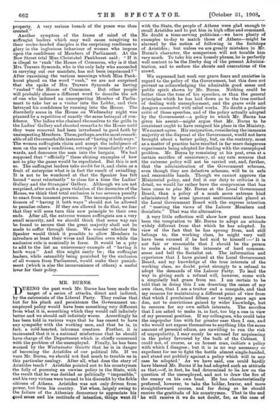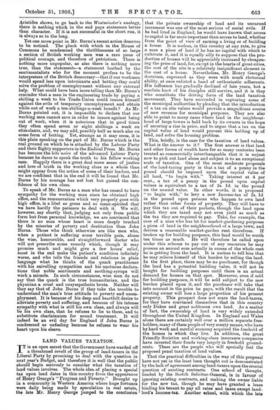MR. BURNS.
DURING the past week Mr. Burns has been made the target of a series of attacks, direct and indirect, by the extremists of the Liberal Party. They realise that but for his pluck and persistence the Government un- employed policy would have been something very different from what it is, something which they would call infinitely better and we should call infinitely worse. Accordingly he has been told in various ways that he has ceased to have any sympathy with the working men, and that he is, in fact, a cold-hearted, inhuman creature. Further, it is insinuated that it is a national misfortune that he should have charge of the Department which is chiefly concerned with the problem of the unemployed. Finally, he has been warned by the Westminster Gazette that he is in danger of becoming the Aristides of our political life. If we were Mr. Burns, we should not find much to trouble us in this particular analogy. After all, what does the story of Aristides teach ? Aristides pointed out to his countrymen the folly of pursuing an unwise policy in the State, with the result that he was derided as politically "impossible," and his very virtues were turned to his discredit by the fickle citizens of Athens. Aristides was not only driven from power, but from his country. Yet when, largely owing to the failure of the Athenian democracy to appreciate his good gauge and his rectitude of intention, things went ill with the State, the people of Athens were glad enough to recall Aristides and to put him in high office and command. No doubt a time-serving politician—we have plenty of examples to-day to match those of Athens—plight be alarmed by the notion of following in the footsteps of Aristides ; but unless we are greatly mistaken in Mr. Burns's character, the comparison will not trouble him very much. To take his own homely phrase, he is perfectly well content to be the Derby dog of the present Adminis- tration, and to endure the shouts and execrations of the crowd.
We expressed last week our grave fears and anxieties in regard to the policy of the Government, but this does not prevent us acknowledging the admirable good sense and public spirit shown by Mr. Burns. Nothing could be better than the tone of his speeches, or than the general principles which he has laid down as to the true method of dealing with unemployment, and the grave evils and. dangers connected with relief works. No doubt a pedantic critic of those speeches, and of the policy actually adopted by the Government—a policy to which Mr. Burns has given his assent—might argue that Mr. Burns to be consistent ought to have resigned his place in the Ministry. We cannot agree. His resignation, considering the immense majority at the disposal of the Government, would not have brought about a better policy, but, on the contrary, must as a matter of practice have resulted in far more dangerous experiments being adopted for dealing with the unemployed problem. Mr. Burns by remaining at his post, even at a certain sacrifice of consistency, at any rate ensures that the extreme policy will not be carried out, and, further, that the administration of the Government schemes, even though they are defective schemes, will be in safe and reasonable hands. Though we cannot approve the Ministerial policy, and feel it our duty to criticise it in detail, we would far rather have the compromise that has been come to plus Mr. Burns at the Local Government Board, than a policy of a much more extreme kind administered by some ignorant sentimentalist placed at the Local Government Board with the express intention of "meeting the views of the Labour Members and Socialists." That was the alternative.
A very little reflection will show how great must have been the temptation to Mr. Burns to adopt an attitude widely different from that which he has adopted. In view of the fact that he has sprung from, and still belongs to, the working class, he might very well have been excused if he had said to himself It is not fair or reasonable that I should be the person to make a stand in the interests of hard common- sense and bell the Socialist cat. The information and experience that I have gained at the Local Government Board, and my knowledge of the true interests of the working class, no doubt point strongly to a refusal to adopt the demands of the Labour Party. To lead the way in giving such a refusal will, however, come with a singularly bad grace from me. I am certain to be told that in doing this I am deserting the cause of my own class, that I am a traitor and a renegade, and that my reasons for maintaining a different point of view from that which I proclaimed fifteen or twenty years ago are due, not to convictions gained by wider knowledge, but to concern for my own selfish interests. The sacrifice that I am asked. to make is, in fact, too big a one in view of my personal position. If my colleagues, who could take the unpopular line with far greater ease than I can, and who would not expose themselves to anything like the same amount of personal odium, are unwilling to run the risk- of unpopularity, I may surely be excused for acquiescing in the policy favoured by the bulk of the Cabinet. I could not, of course, as an honest man, initiate a policy with which I disagree ; but it is in no way necessary or expedient for me to fight the battle almost single-handed, and stand out publicly against a policy which will in any case be adopted.' As we have said, one could hardly have blamed Mr. Burns if he had adopted such an attitude as that,—if, in fact, he had determined to lie low on the question of the unemployed, and. not to draw the fire of the enemy on his own head. He has characteristically preferred, however, to take the bolder, braver, and more straightforward course, and for doing so he should receive the gratitude of his countrymen. That in the end he will receive it we do not 'doubt, for, as the ease of Aristides shows, to go back to the Westminster's analogy, there is nothing which in the end pays statesmen better than character. If it is not successful in the short run, it is always so in the long.
Yet one more point in Mr. Burns'e recent action deserves to be noticed. The pluck with which in the House of Commons he condemned the thriftlessness of so large a section of British working men was a rare piece of political courage, and therefore of patriotism. There is nothing more unpopular, as also there is nothing more true, than the statement,a statement loathed by the sentimentalists who for the moment profess to be the interpreters of the British democracy—that if our workmen would spend less upon intoxicants and, betting they could solve the problem of unemployment without any external help. What could have been more telling than Mr. Burns's reminder that a man in the engineering trade by paying a shilling a week to his Trade-Union could insure himself against the evils of temporary unemployment and obtain w,hile out of work a ten-shillings-a-week benefit? As Mr. Burns pointed out, it is impossible to declare that our working men cannot save in order to insure against being out of work, when it is notorious that in good times they often spend seven or eight shillings a week on stimulants, and, we may add, possibly half as much also on some form of betting. Yet, strange as it may seeni, it is this plain speaking on the part of Mr. Burns which is the real ground on which he is attacked by the Labour Party and their flighty supporters in the Radical Press. Mr. Burns has become the bête noire of the advanced Labour Party because he dares to speak the truth to his fellow working inpn. Happily there is a great deal more sense of justice and love of truth in the working class as a whole than might appear from the action of some of their leaders, and we are confident that in the end it will be found that Mr. Burns by his courage has not lost but gained the con- fidence of his own class.
To speak of Mr. Burns as a man who has ceased to have sympathy for the working man since he obtained high office, and the remuneration which very properly goes with high office, is a libel so gross and so mean-spirited that we have hardly the patience to deal with it. We will, however, say shortly that, judging not only from public form but from personal knowledge, we are convinced that there is no man whose heart is more deeply touched by the miseries of poverty and destitution than John Burns. Those who think otherwise are like men who, when a patient is suffering some terrible pain, abuse the wise, honourable, and straightforward doctor who will not prescribe some remedy which, though it may promise much and might give a few hours' relief, must in the end make the patient's condition infinitely worse, and who tells the friends and relations in plain language what he thinks of the quack practitioner with his snivelling sympathies and his unctuous declara- tions that noble sentiments and soothing-syrups will work a miracle. In such circumstances, wise men do not say that the quack is the true humanitarian, and the physician a cruel and unsympathetic brute. Neither will they say that of John Burns if they take the trouble to understand the man's true attitude to poverty and unem- ployment. It is because of his deep and heartfelt desire to alleviate poverty and suffering, and because of his intense sympathy with what is still his own class, and always will be his own class, that he refuses to lie to them, and to substitute charlatanism for sound treatment. It will indeed be an evil day for England if John Burns is condemned as unfeeling because he refuses to wear his heart upon his sleeve.















































 Previous page
Previous page